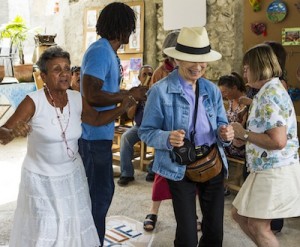The following is written by Catherine Sagan, who participated in a professional educators tour in March 2013. Here she shares her perspective on visiting Cuba for the first time.
Going to Cuba has been a back burner dream of mine ever since my years in Guatemala in the 60s when I had worked among the poor in the Cuchumatanes Mountains, and then had to leave for political reasons. The 60s were the beginning of the Guatemalan Civil war, and a group of us religious, priests, and lay people got enthusiastically involved in wanting to make a difference in the lives of the oppressed poor. It was the era of John F. Kennedy and Pope John XXIII’s call to individual responsibility and response to the problems at hand.
Even though the parish in Guatemala in which I worked as a Maryknoll missionary sister had many excellent social programs: a coffee cooperative, a credit union, literacy classes for adults, courses on better farming methods, and an ungraded school for children from distant villages where there were no schools for them, the priest and sister that I was working with at the time became convinced that our efforts were only helping a minimally few people, that the vast majority of poor Guatemalans, in particular, the indigenous people, were being sucked dry by the exploitative system prevalent in Guatemala then, practices to a certain extent that continue to exist today.
Prior to these events, I had been hearing about the Literacy campaign in Cuba via Guatemalan radio and the gossip that happens among foreigners. In Fidel Castro’s speech of 4 hours at the United Nations assembly in 1960, he vowed that Cuba, in one year, would become the first Latin American country to be totally alphabetized, that is, literate – capable of reading and writing in Spanish. This boast intrigued me. Our efforts with the ungraded school and the literacy classes we were providing in Guatemala were successful, but only to a point. Those poor children and adults who had attended our classes did learn, but what about the hundreds of thousands of others? Our efforts were really just a drop in the bucket of need.
The successful Cuban literacy campaign of 1961 was what I was most interested in and wanted to learn more about. For Cuba to go from a 60-76% literacy rate to 96% literacy rate in one year was a marvel that seemed to belong in “Ripley’s Believe it or Not.”
Reflecting on this recent trip to Cuba, viewing the country and its present challenges, I saw many areas of progress, for example, in the area of education. Everyone has access to a free education and is guaranteed a job after graduating. In order to avoid degree glut in some professional areas, some of these academic opportunities to pursue are limited, so that there is not what is now happening in the United States, too many lawyers, doctors, teachers, nurses, etc. and no jobs in these fields. Coming from our ingrained individualism as Americans, we might say that the Cuban government is interfering with free choice. Yet, it is something to consider that American graduates in many of the above mentioned fields of expertise are worried about how they are going to pay back their huge student loans on a salary of minimum wage.
Would I ever go back to Cuba? Yes, in a heartbeat! The times I had an opportunity on this recent trip to visit Cubans in their homes or in a relaxed environment have convinced me that there is something special about Cuban people. I admire their resilience in making lemonade with rum when the United States gave them sour lemons through the blockade. Perhaps it could be said that they thought “outside the box” of how to survive in their given social system, a little, little country only 90 miles from the shores of one of the most powerful countries in the world.
Thanks Catherine for sharing your thoughts with us!
Take Action!
For more stories like these, make sure to:
